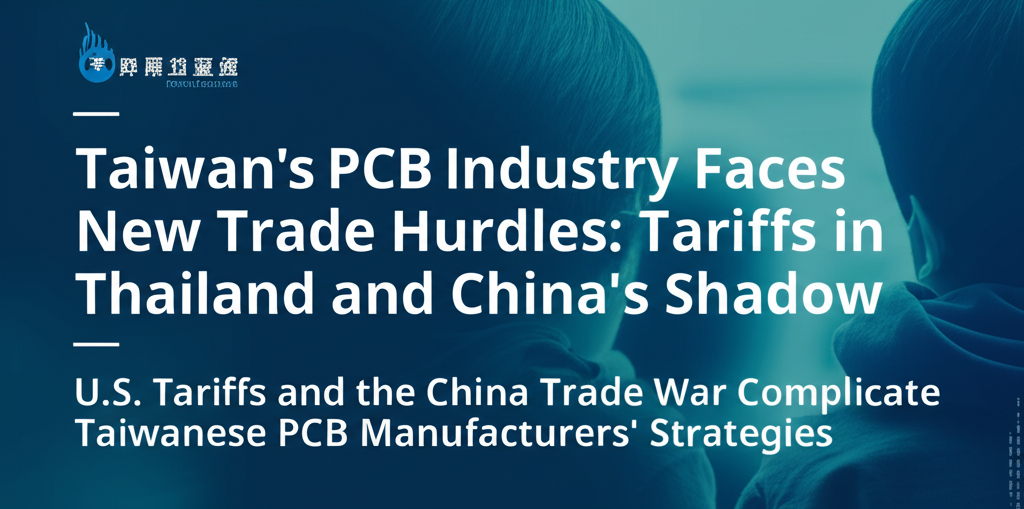Taiwan's PCB Industry Faces New Trade Hurdles: Tariffs in Thailand and China's Shadow
U.S. Tariffs and the China Trade War Complicate Taiwanese PCB Manufacturers' Strategies.

Taipei, Taiwan – The Taiwanese printed circuit board (PCB) industry is navigating a complex landscape of global trade tensions, with recent developments in Thailand posing new challenges. According to Li Chang-ming (李長明), former chairman of the Taiwan Printed Circuit Association (TPCA), the imposition of a 37% reciprocal tariff by the U.S. on Thailand could lead to a slowdown in production for Taiwanese PCB suppliers operating in the Southeast Asian country.
Li Chang-ming (李長明), who stepped down as TPCA chairman in March, expressed surprise at the high tariff imposed on Thailand. He highlighted the potential for Taiwanese PCB makers, who have established 14 production bases in Thailand, to become more cautious about expanding their presence there. Li is also a senior advisor to Unimicron Technology Corp., a Taiwan-based Ajinomoto build-up film (ABF) supplier.
Other prominent Taiwanese PCB firms with investments in Thailand include Compeq Manufacturing Co., ZhGolen Ding Technology Holding Ltd., and Gold Circuit Electronics Ltd. This makes Thailand a significant overseas manufacturing hub for Taiwanese PCBs, critical components used in various electronic products.
The announcement follows a new round of U.S. tariffs declared by the Trump administration. Originally, the U.S. planned a 10% baseline tax on imports starting April 5, with higher duties for countries with substantial trade surpluses. These duties were set to impact Taiwan (32%), China (34%), Japan (24%), South Korea (26%), Vietnam (46%), and Thailand (37%).
However, the U.S. later announced a 90-day pause on these measures, implementing a reduced 10% duty for all countries except China.
Li Chang-ming (李長明) noted his surprise at the higher tariffs on Thailand and Vietnam compared to Taiwan. He emphasized that this situation presents a challenge for Taiwanese PCB makers, particularly those manufacturing in Thailand. The initial move to Thailand aimed to mitigate the impact of the escalating U.S.-China trade war.
Given the latest developments, these manufacturers are now expected to slow down their production in Thailand of products destined for the U.S. market.
The trade war between Washington and Beijing also remains a major concern for Taiwanese PCB producers, given their extensive production facilities in China. Trump has significantly increased tariffs on goods made in China, and China has retaliated with its own tariffs on American products.
Li Chang-ming (李長明) suggested that Taiwanese PCB producers might need to reassess their investment strategies in China, possibly focusing on selling their products within China instead of exporting them.
Regarding the potential for bringing manufacturing jobs back to the U.S., Li Chang-ming (李長明) explained that it is not a straightforward option for Taiwanese PCB suppliers due to the lack of a comprehensive supply chain and higher labor costs. He believes that manufacturing in the U.S. could create a significant financial burden.
Chiu Shih-fang (邱昰芳), an analyst with the Taiwan Industry Economic Services under the Taiwan Institute of Economic Research, added that component makers like PCB suppliers face greater obstacles in establishing production in the U.S. compared to tech gadget assemblers.
Chiu Shih-fang (邱昰芳) also expressed concerns about the potential impact of tariff-driven price increases on end-user demand for products like electric vehicles, servers, laptops, and smartphones, all of which rely on PCBs. She warned that a decline in end-user demand could negatively affect the demand for PCBs. Additionally, she noted that Taiwanese PCB firms could face financial risks if they are asked to absorb increased costs due to tariffs.
Other Versions
Error: All DeepL API keys exceeded 95% usage.
Error: All DeepL API keys exceeded 95% usage.
Error: All DeepL API keys exceeded 95% usage.
Error: All DeepL API keys exceeded 95% usage.
Error: All DeepL API keys exceeded 95% usage.
Error: All DeepL API keys exceeded 95% usage.
Nahaharap ang Industriya ng PCB ng Taiwan sa Bagong Hadlang sa Kalakalan: Taripa sa Thailand at Anino ng Tsina
Error: All DeepL API keys exceeded 95% usage.
อุตสาหกรรม PCB ของไต้หวันเผชิญอุปสรรคทางการค้าใหม่: ภาษีในประเทศไทยและเงาของจีน
Ngành PCB của Đài Loan đối mặt với những rào cản thương mại mới: Thuế quan ở Thái Lan và cái bóng của Trung Quốc
